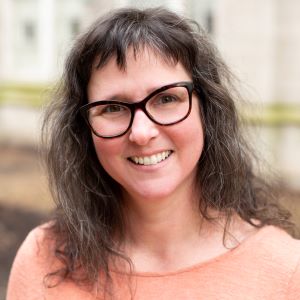Explore Undergrad at SPS — Communication Studies Instructor Jennifer Baker

Are you easily persuaded? Do you use persuasion appropriately and ethically? These are some of the questions students try to answer in Communication Studies Instructor Jennifer Baker’s undergraduate Theories of Persuasion course at Northwestern University School of Professional Studies (SPS). They work together to understand the forces of persuasion in our society, the theories behind it, and how it can help us communicate more effectively in personal and professional relationships.
“My students begin knowing that persuasion exists, but not how often it actually affects their lives,” Baker says. “They tend to assume it’s a bad thing, but it really isn’t. You need to understand how its power works and find the balance between persuasion and manipulation or deceit.”
Baker’s career as a communication expert began when she was an undergraduate at the University of Texas in Austin, during an interpersonal communication class.
“I couldn’t believe you could own your communication style,” she says. “That you can actively learn how to communicate better using tools, theories, language, and nonverbal interaction. That’s why communication is inherently fascinating to me and has informed all I’ve done professionally.”
Diverse Communication Experience
Those experiences include starting an inner city high school speech/debate team, producing a radio show on communication, writing technical and corporate communications, working at an engineering firm and a marketing company, and of course teaching. Baker first taught at University of Texas, where she earned her MA, moved on to the University of North Carolina Greensboro and then to Northwestern University. At Northwestern, she teaches both graduate and undergraduate classes—for which she earned a Distinguished Teaching Award—and serves as Faculty Director of the Master’s in Information Design & Strategy (IDS) program.
In the IDS program, Baker teaches Capstone, the last course in the program, which is an experiential practicum where students connect their deep academic learning with real-life experiences and situations. Her interest in experiential learning carries over into her undergraduate classes. Her classes are discussion based and she emphasizes practical skills, such as applying persuasion to problem solving, presenting, or proposing new projects or job functions.
Baker knows it’s not easy returning to school as an adult, and she recommends using what her classes are all about: communication.
“Life happens,” she says. “I suggest always talking with your professors. Let them know what’s going on or what your fears are. Most of the time we can be flexible. Remember that there is no single route to success—set your own pace, and we’ll help you get there.”
